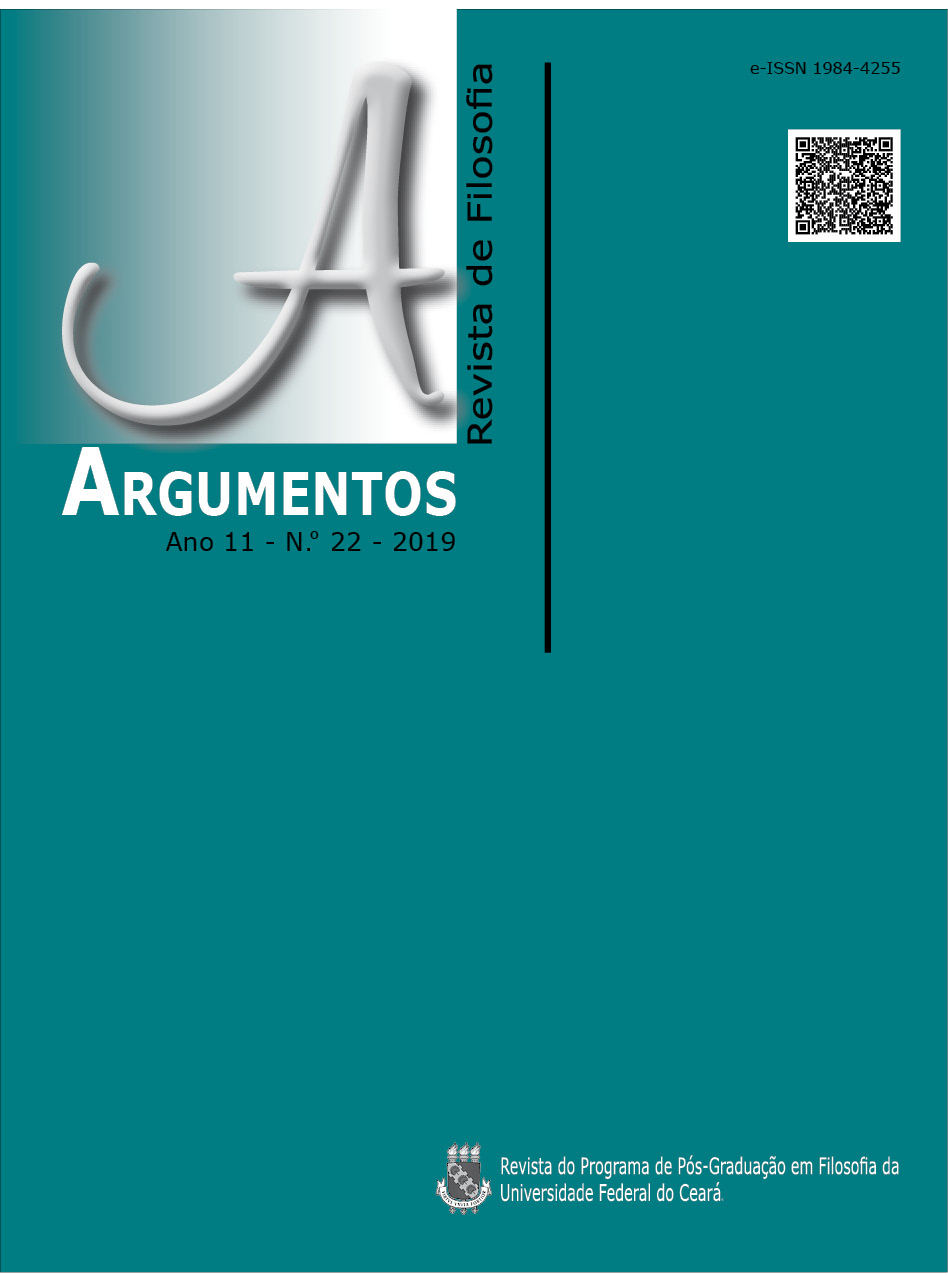An intermediate term functor logic
DOI:
https://doi.org/10.36517/Argumentos.22.2Palabras clave:
Plus-minus algebra. Non-classical quantifiers. Common sense reasoning.Resumen
Neste artigo, tentamos fazer algo bastante simples: conhecer os avanços de Sommers e Englebretsen (a saber, uma álgebra mais-menos para silogística) juntamente com os desenvolvimentos de Peterson e Thompson (ou seja, uma extensão da silogística com “a maioria”, “Muitos” e “poucos”). O resultado é uma silogística intermediária que lida com uma ampla gama de padrões lógicos, mas com as virtudes de uma abordagem algébrica.Citas
CARNAP, Rudolf. Die alte und die neue Logik. Erkenntnis, 1, 12–26, 1930.
ENGLEBRETSEN, George. The New Syllogistic. Peter Lang, 1987.
ENGLEBRETSEN, George. Linear Diagrams for Syllogisms (with Relationals). Notre Dame J Formal Logic 33(1), 37–69, 1991.
ENGLEBRETSEN, George. Something to Reckon with: The Logic of Terms. University of Ottawa Press, 1996.
ENGLEBRETSEN, George and SAYWARD, Charles. Philosophical Logic: An Introduction to Advanced Topics. Bloomsbury Academic, 2011.
GEACH, Peter. Reference and Generality: An Examination of Some Medieval and Modern Theories. Cornell University Press, 1962.
GEACH, Peter. Logic Matters. University of California Press, 1980.
KHEMLANI, Sangeet and JOHNSON-LAIRD, Philip. Theories of the Syllogism: a Meta-Analysis. Psychological Bulletin, 427–457, 2012.
KUHN, Steven. An Axiomatization of Predicate Functor Logic. Notre Dame J Formal Logic 24(2), 233–241, 1983.
MOSS, Lawrence. Natural Logic. In: Lappin, S., Fox, C. (eds.) The Handbook of Contemporary Semantic Theory, John Wiley & Sons, 2015.
MOSTOWSKI, Anderzj. On a Generalization of Quantifiers. Fundamenta Mathematicae 44(2):12–36, 1957.
MOZES, Eyal. A Deductive Database Based on Aristotelian Logic. Journal of Symbolic Computation 7(5):487–507, 989.
MURPHREE, Wallace. Numerical term logic. Notre Dame J Formal Logic, 39(3):346–362, 1998.
NOAH, Aris. Predicate-functors and the Limits of Decidability in Logic. Notre Dame J Formal Logic 21(4):701–707, 1980.
NOAH, Aris. Sommers’s Cancellation Technique and the Method of Resolution. In: Oderberg, D. (ed.) The Old New Logic: Essays on the Philosophy of Fred Sommers, Bradford, pp. 169–182, 2005.
PAGNAN, Ruggero. A Diagrammatic Calculus of Syllogisms. Journal of Logic, Language and Information 21(3):347–364, 2012.
PETERSON, Philip. On the Logic of “Few”, “Many”, and “Most”. Notre Dame J Formal Logic 20(1):155–179, 1979.
QUINE, Willard Van Orman. Predicate Functor Logic. In: Fenstad, J.E. (ed.) Proceedings of the Second Scandinavian Logic Symposium, North-Holland, 1971.
SOMMERS, Fred. On a Fregean Dogma. In: Lakatos, I. (ed.) Problems in the Philosophy of Mathematics, Studies in Logic and the Foundations of Mathematics, v. 47, Elsevier, pp. 47–81, 1967.
SOMMERS, Fred. The Logic of Natural Language. Oxford University Press, 1982.
SOMMERS, Fred. Intelectual Autobiography. In: Oderberg, D. (ed.) The Old New Logic: Essays on the Philosophy of Fred Sommers, Bradford, pp. 1–24, 2005.
SOMMERS, Fred and ENGLEBRETSEN, George. An Invitation to Formal Reasoning: The Logic of Terms. Ashgate, 2000.
THOMPSON, Bruce. Syllogisms using “Few”, “Many”, and “Most”. Notre Dame J Formal Logic 23(1):75–84, 1982.
THOMPSON, Bruce. Syllogisms with Statistical Quantifiers. Notre Dame J Formal Logic 27(1):93–103, 1986.
VEATCH, Henry Babcock. Intentional Logic: a Logic Based on Philosophical Realism. Archon Books, 1970.
WESTERSTÅL, Dag. Aristotelian Syllogisms and Generalized Quantifiers. Studia Logica 48(4):577–585, 1989.
Descargas
Publicado
Número
Sección
Licencia
Los autores que publican en esta revista aceptan los siguientes términos:
- Los autores mantienen los DERECHOS AUTORALES otorgados a la revista O el Derecho de Primera Publicación, con el trabajo licenciado simultáneamente a Creative Commons License Attribution (CC BY) que permite compartir el trabajo con reconocimiento de autoría y publicación inicial en esta revista.
- Los autores pueden aceptar contratos, distribución no exclusiva de la versión del trabajo publicado en esta revista (por ejemplo: publicación en el repositorio institucional o como capítulo del libro), con reconocimiento de autoría y publicación inicial en esta revista.
- Se permite a los autores publicar y distribuir su trabajo on-line (por ejemplo, en repositorios institucionales o en su página personal) durante el proceso editorial de información de que el artículo está en proceso de publicación. Esto puede aumentar el impacto y cita de trabajos publicados.

SOBRE COPYRIGHT Y POLÍTICA DE ACCESO LIBRE
La revista utiliza la atribución CC BY



.jpg)










._._3.png)
1.jpg)
._._._.png)
